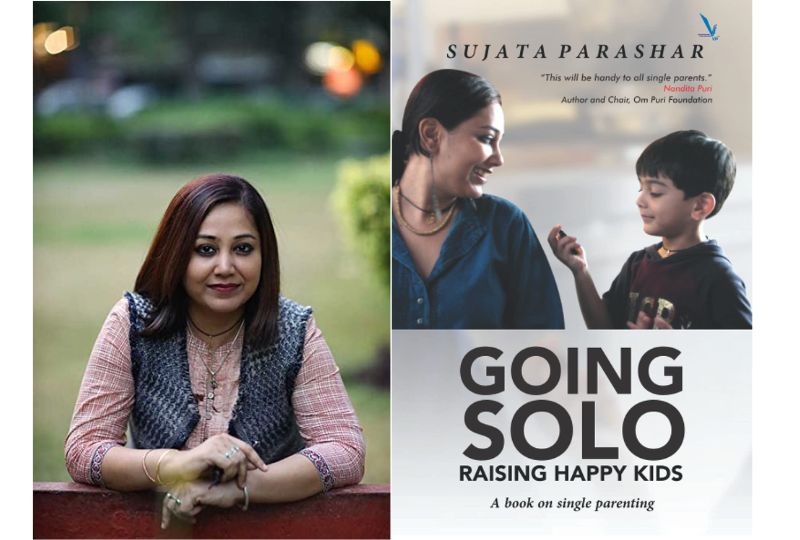Interview with Sujata Parashar, author of “Going Solo: Raising Happy Kids”, Psychosocial Trainer & TiOE founder
on Apr 06, 2023

Bestselling novelist, short-story writer and poet, Sujata Parashar became widely popular with her ‘Pursuit’ series and has so far written nine books across genres. This postgraduate in human rights, however, has a rich and diverse work experience. Apart from authoring bestsellers, Sujata is also the founder of a talk-therapy based platform, The Talk-It-Out-Express; a platform to enhance emotional wellbeing.
She was the recipient of the 100 Women Faces 2018 award, instituted by Womennovator and COWE (the Confederation of Women Entrepreneurs of India) for her contribution to Indian literature. She was also presented the prestigious Karamaveer Chakra Award (in 2016 and 2019)
Frontlist: How did your experiences as a single parent inspire you to pen down your book?
Sujata: I’ve been the primary caregiver for my son for the most part even when I was married. His dad’s nature of work didn’t allow him to spend a lot of time with our son. Later, when I relocated to India (from Singapore), I thought I was ready to take care of my son as a single parent. He was barely four then. What I didn’t realise was that raising a child in a single parent household requires breaking down the old structure, creating a new set-up and a change in parenting style as the needs and challenges in single parent households are different. The entire responsibility of the new family is on the single parent and the sudden change destabilises the children as well. It was the same in my case. However, it all changed when I attended a powerful parenting program in Texas as a psychosocial trainer. The program was created for parents of bleeding disorders community especially the Hemophilia community. Not only did it enhance and upgraded my professional skills as a psychosocial trainer but also it gave me insight about where I was going wrong and some wonderful tools that I could use to better my parenting style. Little changes in my own parenting style like age appropriate discussions with my son, reaching out to others for support when I needed it, getting my son used to the new normal or the new structure et al helped me immensely in ensuring a stable and happy environment at home. Of course, as a writer I was also motivated to write a book based on my own experience and those of other single parents, (especially as I couldn’t find any books written for Indian single parents).
Frontlist: What is the most significant misconception about mental health, and how does your book address it?
Sujata: The most significant (and most common) misconception about mental health is that there’s nothing one can do if one is feeling low or depressed. People simply suppress and hide their negative emotions and carry on. However, if one is emotionally disturbed and it’s impacting their routine life they need help to get better. In my book there’s a separate chapter on importance of self-care in single parenting. In order to provide a nurturing environment to the children, single parents have to recognize, understand and manage their psychological challenges well. I’ve offered some tools and effective ways that will help single parents un-bottle their negative emotions, manage them and even come out of the negative state.
Frontist: How can we reduce mental health stigma, and what role does your book play in that effort?
Sujata: Firstly, it’s important to recognize that it’s okay to feel sad, dejected or downcast. Everybody goes through such low phases in life. It’s perfectly normal. Then recognize the negative feeling and take measures to get out of that negative state; talk about it with family and friends, look for support groups and ask questions, focus on the positives. Keep yourself busy doing things you like and most of all seek help if you continue to feel low and you see it’s impacting your life. As I said, there’s a whole chapter dedicated to importance of self-care in single parenting and a large part of it is on how single parents can recognize and cope with mental/emotional health issues.
Frontlist: What message do you hope your book sends to single parents struggling with mental health issues?
Sujata: The only message I want to give to single parents is that it is absolutely crucial to take care of their own emotions before they focus on parenting. It isn’t easy. There are multiple challenges. And yet, if single parents want to have a stable and happy home for their children and themselves, it’s important to start by focusing on their own mental and emotional health. Don’t hesitate to reach out for help. Join a support group. And most important of all have age-appropriate discussions with your children and share your concerns in a non-blaming way, involve them in household chores and important decisions. I learnt it the difficult way but once I was on that journey the turnaround was absolutely wonderful.
Frontlist: How do you hope your book will contribute to a larger conversation about mental health and single parenting?
Sujata: There were no books to guide me when I was raising my son as a single parent. I wasn’t even ready to disclose my single mother status to the world. After attending the international parenting program, I finally realised how important it is to parent your child the right way. I also realised that the needs and challenges of single parents are unique and different than those of dual parents. The idea kept brewing in my mind for many years before I finally decided to take action and write it down. I hope it helps other single parents like me. Moreover, 50 other single parents (both by compulsion and by choice) have contributed to the books enriching it with their personal experiences, ideas and thoughts on single parenting.
Also, one of the primary reasons I wrote this book was to help single parents recognise the importance of their own emotional health if they want to provide a nurturing environment to their children and raise them into strong, capable and happy individuals. I’m hoping the message gets across to the readers (especially single parents) and trigger drawing room conversation as well as public discussions on the topic.
Frontlist: What advice would you give someone hesitant to seek help for their mental health, and how can we work towards destigmatizing mental health treatment?
Sujata: Anything that causes unease to the body or mind needs treatment. For any physical disease we don’t hesitate to go to the doctor. That’s the kind of thinking one must have for mental health issues also.
Frontlist: How can we foster a culture of open and honest conversation about issues you addressed in your book, and what role can education and awareness campaigns play in this process?
Sujata: To foster a culture of open and honest conversation about difficult topics, we as individuals and as a collective must keep an open and nonjudgmental mind. Accept different perspectives. Give others space to voice their opinion. Agree to disagree but let’s not suppress, ignore or neglect discussions on such important issues.
Awareness campaigns do the crucial job of igniting minds and drawing attention of society to important causes. They informing and educate and trigger further discussion.
Frontlist: How can we better engage with communities hesitant to discuss mental health, such as rural or conservative population?
Sujata: Get in touch with psychosocial trainers and facilitators especially those who’ve worked with the rural/conservative population. Have informal and intimate baithaks with the rural women first. The men will follow. J Under the Talk-It-Out-Express (TiOE) workshops we include a lot of expressive-art-therapy based activities including drawing, music, dance and fun games to convey the message in a non-preachy, comfortable and interesting way. The participants are fully involved in these multi-activity based workshops and by the end of it themselves volunteer to carry the program forward. Also, such workshops have greater impact and acceptability than one-sided talk sessions on the topic.

.jpg)
.jpg)
.jpg)
.jpg)
.jpg)
.jpg)

.jpg)

.jpg)
.jpg)

.jpg)
.jpg)
.jpg)










Sorry! No comment found for this post.